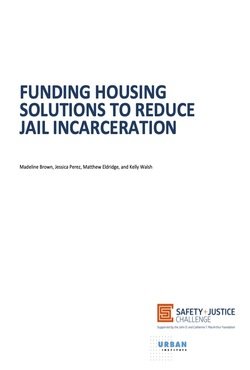Funding Housing Solutions to Reduce Jail Incarceration
By Madeline Brown, Jessica Perez, Matthew Eldridge, and Kelly Walsh
As counties across the United States search for ways to reduce the oversized and damaging footprint of our criminal justice system, many are looking upstream—to housing and the evidence that connects it to economic stability and overall well-being. In 2020, the Urban Institute set out to identify local housing programs and policies that had been evaluated for their ability to reduce jail incarceration. We held three private roundtables with practitioners, people with lived experience of jail incarceration, and subject matter experts across housing, behavioral health, and criminal justice sectors to better understand how gaps across service areas and lack of coordination are preventing large-scale systems change. We were specifically interested in learning how existing funding streams limit housing options for people with criminal justice involvement and how the role of impact investing and other financing models could help remove those limits. This report presents the learning from that work and elements of investment-ready housing strategies with the potential to reduce the use of local jails.
Washington, DC: Urban Institute, 2021. 35p.


